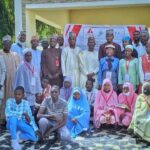One of the major negative impacts of COVID-19 on the Nigerian economy was huge job cuts by employers to survive the economic downturn.
The National Bureau of Statistics (NBS) reported over the weekend that 42 per cent of Nigerian workers lost their jobs as a result of the impact of COVID-19, diminishing incomes of 79 per cent of households in the country.
- Disabled persons to benefit from FG jobs in Kwara
- ‘Why Nigeria is losing jobs, revenue in maritime sector’
“The impact on employment and income has also been widespread. The impact of COVID-19 has been most strongly felt in the commerce, service and agriculture sectors,” NBS explained.
The country’s apex statistical Bureau revealed that “experience of economic shocks in the few months after the outbreak of coronavirus far exceeds shocks experienced between 2017 and 2019.”
The challenge before the country at the moment is how to replace those lost jobs, even as unfolding events suggest that novel skills will be needed for future jobs.
It is a standard corporate practice for organisations across the globe to regularly embark on organisational rejuvenation and re-strategising to re-energise their activities for optimal corporate performances.
This is undoubtedly the option before many employers as post-COVID-19 labour needs may not conform to the pre-coronavirus lockdown era.
Going by NBS’ data, about 20.9 million Nigerians are without jobs as at the third quarter of 2018. Apart from this figure, about four million men and women enter the workforce, with only a small fraction of them being able to find formal and gainful employment. This, according to findings, makes the problem of youth unemployment a phenomenal issue, culminating into widespread poverty and hardship among the youth.
The resultant effect is increased social instability, youth restiveness and worsening insecurity. Experts are of the view that the growing unemployment figure is a confirmation that growth in the economy is still weak and not inclusive.
They argued that the chief driver of the economy, which is the oil sector, is not employment elastic, adding that there is the need to stimulate growth in sectors that have strong linkages to job creation, such as manufacturing, construction, information and communication technology and agriculture.
This, according to them, would entail massive investments in infrastructure and putting in place measures to ensure that these sectors are able to access credits at single digit interest rate.
In view of the huge number of youths that enter into the labour market each year, analysts are of the view that the government should focus on creating the right environment, including investing in entrepreneurial education and skills acquisition in order to reduce the current high unemployment rate of about 23 per cent.
The Industrial Training Fund (ITF) seems to have realised this new challenge and has initiated homegrown plans to help job seekers and labour seekers get what they desire, despite the disruptions of COVID-19.
To appreciate the challenge the more, the national vice president, North Central of the National Association of Small and Medium Enterprises (NASME), Auwal Bununu Ibrahim, an engineer, projected that about 50,000 workers had been disengaged in the Micro, Small and Medium Enterprises (MSMEs) sub-sector of the economy.
Ibrahim said over 10,000 MSMEs businesses had collapsed across the country.
“I know that over 10,000 micro enterprises who are employing three to five people have collapsed across the country, mainly in the North. So, if you multiply three to five by 10,000, you can see how many jobs have been lost. The 10,000 I am talking about is based on our own evaluation as an association. There are more who have lost their jobs,” Ibrahim said.
Despite the ITF’s many achievements due to the implementation of skilling plans, on the assumption of the incumbent management of the Fund, there was the urgent need to reposition the agency to address the policy goals of the Federal Government in terms of creating the necessary skills for employment among the youth.
Against this realisation, the management of the Fund, under the leadership of Joseph Ari, unveiled the ITF Reviewed Vision: Strategies for Mandate Actualisation, which was considered by many as its most ambitious plan since its establishment.
The implementation of the plan led to the training of over 500,000 Nigerians, expansion of infrastructure and automation of business processes, among other numerous achievements.
As a mark of responsiveness and commitment to continuous improvement, the ITF, last week unveiled the second phase of its reviewed vision.
In the light of the COVID-19 pandemic and the challenges it posed to countries and organizations, coupled with the dire unemployment projections that the number of unemployed Nigerians may rise by the end of 2020, the plan expectedly contained practical solutions that will re-energise its stakeholders as they grapple with the attendant effects of unemployment.
But Ari said that within the last two years, over 500,000 Nigerians had been trained in various skills acquisition programmes by the ITF.
Speaking on the new plan, he said although it focused on nine key areas of the ITF services, including direct training services, revenue generation and sustainable funding, special intervention programmes, students’ industrial work experience scheme, research and development, as well as automation of business processes, special attention would be given to the agricultural sector, vocational skills training and the development of small businesses.
Under the plan, and as part of deliberate efforts to drive the back-to-farm initiative of the Federal Government, and to train Nigerians along the agri-business value chain for job/wealth creation and food security, Ari said the ITF would develop an integrated farming model and use arable lands owned by the Fund across the country to establish demonstration farms. He said this would be used for training Nigerians.
To expand its skills acquisition programmes, Ari said arrangements had been concluded for procurement of three additional mobile training vans, while vocational wings will be established in its Awka, Maiduguri, Port Harcourt, Akure, Gusau, and Minna area offices.
The ITF boss said the vocational centres would be used to train Nigerians within the states in various trade areas. For instance, he said the ITF would develop a curriculum to address identified training needs, as well as conduct needs analysis to determine training needs in agriculture (food processing), hospitality and transport sectors.
The skills development expert also said the Fund would develop a curriculum that would address the identified needs, adding that the curriculum for special intervention programmes would be in line with identified trade areas and global best practices.
Findings by Daily Trust Saturday also showed that the ITF would conduct surveys to determine dominant/relevant trades and mode of intervention required, as well as design and develop curriculum for programmes implementation in the identified trade areas.
One sector that has been heavily affected by COVID-19 is the MSMEs. It is imperative that the ITF should re-engineer the business development support services, as well as the implementation of the Fund’s Start and Improve Your Business model to boost productivity and return on investment for the MSMEs.
In line with the huge economic damage caused by the coronavirus pandemic, it is important that some of these government incubation programmes be implemented at no charge to clients.
While these plans may appear difficult to achieve at face value, Ari said with the support of the Federal Government, the organised private sector, non-governmental and faith-based organisations and other well-meaning Nigerians, the projections would be achieved.

 Join Daily Trust WhatsApp Community For Quick Access To News and Happenings Around You.
Join Daily Trust WhatsApp Community For Quick Access To News and Happenings Around You.


